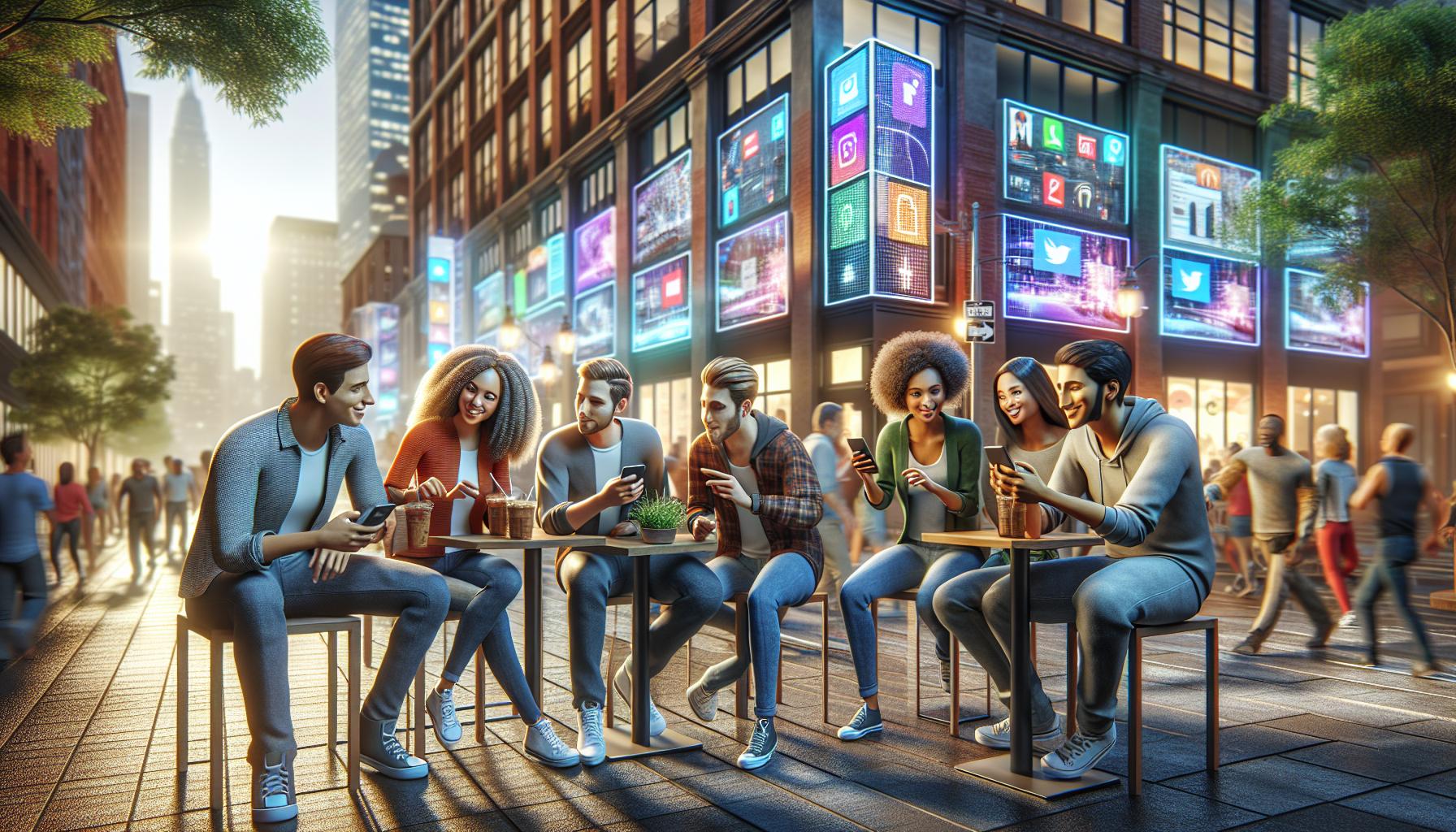In 2018, social media transformed from a simple pastime into a bustling marketplace of ideas, memes, and the occasional cat video that steals the show. As platforms evolved, users found themselves riding the wave of trends that shaped conversations, influenced brands, and even sparked movements. Who knew scrolling through your feed could turn into a masterclass in digital marketing?
2018 Trends Social Media
The l2018 trends social media revealed significant shifts in user engagement and brand interaction. Video content gained prominence with users favoring platforms like Instagram and Facebook for more immersive experiences. Attention to live streaming increased, showcasing events in real time while connecting audiences directly with brands and influencers.
User-generated content became a powerful trend as brands recognized its authenticity. Encouraging their followers to share personal experiences boosted community engagement and brand loyalty. Consequently, companies such as GoPro thrived by showcasing customer-created videos.
The rise of micro-influencers marked a departure from traditional celebrity endorsements. These individuals, often with follower counts ranging from 1,000 to 100,000, provided a more relatable connection to audiences. Their targeted reach often yielded higher engagement rates compared to larger influencers.
Concerns over data privacy significantly influenced social media strategies. Many platforms, responding to user apprehensions, implemented stricter privacy settings. Transparency initiatives from companies like Facebook aimed to rebuild trust among users.
Visual storytelling emerged as a staple in digital marketing. Creative graphics and engaging visuals attracted more attention than static posts. Tools like Canva gained traction among marketers, facilitating the creation of eye-catching content.
Finally, social commerce began to reshape the shopping experience. Platforms integrated shopping features seamlessly into their interfaces, making transactions easier for users. This trend indicated a shift toward a more interactive and engaging shopping environment.
Major Platforms and Their 2018 Trends Social Media

In 2018, social media platforms exhibited distinct trends that shaped user engagement and marketing strategies.
Facebook Trends
Facebook emphasized video content, responding to user demand for more immersive experiences. Live broadcasting gained traction, allowing brands to connect with audiences in real-time. User-generated content grew significantly, fostering community trust and authenticity. Brands like GoPro leveraged this trend effectively, showcasing customer-created videos across their feeds. Privacy concerns prompted Facebook to tighten privacy settings while enhancing transparency measures, which played a pivotal role in rebuilding user trust. The integration of extensive shopping features also catered to commerce, making Facebook a versatile marketplace.
Instagram Trends
Instagram driven by visual storytelling, saw creative graphics capture user attention more effectively than static posts. Influencers with follower counts between 1,000 and 100,000 surged, providing authentic endorsements that resonated with audiences. Features like Stories and IGTV became essential tools for engagement, enabling brands to deliver real-time updates and longer content formats. The rise of shopping capabilities allowed users to complete purchases directly through posts, enhancing the in-app shopping experience. This blend of aesthetics, influencer impact, and shopping convenience solidified Instagram’s status as a dominant platform.
Twitter Trends
Twitter’s platform shifted toward real-time conversations, positioning itself as a hub for immediate news updates. Short, engaging tweets succeeded in capturing users’ attention amid competing content. The trend toward micro-influencers also emerged, with users favoring relatable accounts over traditional celebrity endorsements. Hashtags remained crucial for expanding content reach and engaging broader discussions, often sparking significant social movements. Twitter’s increased focus on transparency and anti-harassment measures aimed to foster a safer environment, encouraging more open dialogue among users.
Impact of Influencer Marketing in 2018

Influencer marketing experienced significant growth in 2018, transforming brand strategies. This shift emphasized authenticity and engagement.
Rise of Micro-Influencers
Micro-influencers emerged as key players with follower counts ranging from 1,000 to 100,000. These influencers established relatable connections, driving higher engagement rates compared to traditional celebrity endorsements. Brands recognized the value of micro-influencers in niche markets, leveraging their authenticity to foster trust. Companies like Glossier embraced collaborations with micro-influencers, resulting in organic reach and genuine customer interactions.
Changes in Consumer Behavior
Consumer behavior adapted significantly in response to influencer marketing. Users sought authenticity over curated perfection, driving interest in genuine content. Followers preferred recommendations from relatable figures, leading to increased trust in products promoted by micro-influencers. This trust translated into enhanced engagement, pushing brands towards collaborative marketing strategies. Social media users actively engaged with content that felt personal and authentic, favoring brands that utilized influencers effectively.
Video Content Dominance

Video content significantly shaped social media engagement in 2018. Users gravitated towards platforms that offered immersive visual experiences, such as Instagram and Facebook.
Live Streaming Popularity
Live streaming emerged as a crucial tool for brands to create real-time connections with their audiences. This immediate interaction encouraged deeper engagement. Events like product launches and Q&A sessions attracted more viewers than static videos. Brands that utilized live streaming saw an uptick in user participation and feedback. Companies like Nike leveraged live broadcasts to enhance their connection with consumers. This trend underscored the importance of authentic engagement in marketing strategies.
Short-Form Video Growth
Short-form videos gained traction as a preferred content format on platforms like Instagram and TikTok. Users expressed a preference for quick, engaging clips that delivered information rapidly. This format appealed to attention spans that are increasingly shorter in the digital landscape. Brands began creating concise videos to highlight products and services effectively. Successful campaigns often utilized trending music and challenges to capture attention. They witnessed impressive engagement rates as consumers shared these entertaining snippets. Short-form content not only captivated audiences but also strengthened brand visibility in crowded feeds.
New Technologies Shaping Social Media
Innovative technologies continue to define social media’s landscape. These advancements enhance user experiences and drive engagement.
Augmented Reality Features
Augmented reality (AR) tools ensured more interactive content for users. Platforms like Snapchat and Instagram integrated AR filters, enabling users to enhance their images and videos with creative effects. Brands rapidly adopted AR to create immersive experiences. For instance, retailers allowed customers to virtually try on products, fundamentally transforming online shopping. Engaging users through AR led to increased brand loyalty, as audiences eagerly shared their experiences on social media platforms.
Chatbots in Customer Engagement
Chatbots emerged as vital tools for businesses aiming to enhance customer support. These AI-driven programs provided instant responses to inquiries, improving interaction efficiency. As a result, brands could offer 24/7 assistance, addressing consumer needs in real time. Many businesses implemented chatbots on platforms like Facebook Messenger, streamlining communication processes and resolving customer issues quickly. Enhanced responsiveness fostered trust and satisfaction, driving repeat interactions and brand loyalty.
Social Media Marketplace
The 2018 trends social media have significantly shaped how brands connect with audiences. Emphasizing authenticity and real-time engagement has become vital for successful marketing strategies. As users increasingly gravitate towards relatable content and immersive experiences, brands that adapt to these preferences will thrive.
The rise of micro-influencers and user-generated content highlights the shift towards community-driven marketing. This evolution not only fosters trust but also enhances brand loyalty. By embracing innovative technologies like augmented reality and chatbots, businesses can further enrich user experiences.
In this dynamic landscape, staying attuned to emerging trends is crucial for brands aiming to maintain relevance and drive engagement in the ever-evolving social media marketplace.

